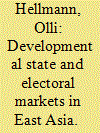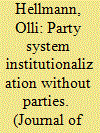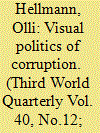| Srl | Item |
| 1 |
ID:
123215


|
|
|
|
|
| Publication |
2013.
|
| Summary/Abstract |
Party systems in East Asia are characterized by a wide variety of party types, as formally institutionalized parties coexist next to informally and weakly institutionalized parties. This variety can be explained in terms of whether political parties enjoyed access to the developmental state's resources at the time of their formation.
|
|
|
|
|
|
|
|
|
|
|
|
|
|
|
|
| 2 |
ID:
107440


|
|
|
|
|
| Publication |
2011.
|
| Summary/Abstract |
The existing literature on party organization is deeply divided over the question of how much freedom of choice decision-makers in a party enjoy in relation to their environment. Although the resulting theoretical deadlock seriously weakens our understanding of party formation and change, no attempt has been made to reconcile the different approaches. This article aims to do just that by offering a historical institutionalist perspective on party organization. Studying the development of political parties in South Korea, it argues that party organizations are best understood as strategic responses to electoral markets. Party organizations reproduce and change, as advantaged factions defend the status quo, while disadvantaged factions work towards organizational reform.
|
|
|
|
|
|
|
|
|
|
|
|
|
|
|
|
| 3 |
ID:
128943


|
|
|
|
|
| Publication |
2014.
|
| Summary/Abstract |
Formally institutionalized party organization is usually considered a prerequisite for the development of programmatic linkages between parties and voters. However, in this article I show that political parties in South Korea have succeeded in stabilizing interparty competition through programmatic linkages without making any significant efforts to build a formal organizational base. In fact, it could be argued that South Korea is a "partyless" democracy, as political parties get easily captured by the interests of ambitious politicians, thus failing to establish themselves as independent actors. I therefore make a more general argument about the concept of party system institutionalization: we need to rethink the current practice of aggregating the different attributes of party system institutionalization into a single scale, as these attributes do not seem to be connected in a linear fashion.
|
|
|
|
|
|
|
|
|
|
|
|
|
|
|
|
| 4 |
ID:
169120


|
|
|
|
|
| Summary/Abstract |
Despite the fact that corruption is essentially invisible, communication campaigns by the global anti-corruption industry regularly feature photographic images. So far, however, we do not know much about the narratives that are encoded in these images. Through the theoretical lens of postcolonialism, this paper takes a first step towards developing an understanding of the visual representation of corruption. Specifically, the paper applies semiotic and iconographic methods to two photography competitions run by Transparency International – the major non-governmental player in the anti-corruption industry. The analysis shows, first, that the anti-corruption industry reinforces colonial stereotypes, suggesting that the ‘sinful’ and ‘irrational’ Global South is waiting to be civilised by the North. Second, through its visual imagery, the anti-corruption industry also emphasises ideas of a ‘humanitarian family’, which serves to cover up the North’s role in transnational webs of corruption. These findings are triangulated with semiotic/iconographic analyses of the Transparency International logo and the Corruption Perceptions Index map.
|
|
|
|
|
|
|
|
|
|
|
|
|
|
|
|